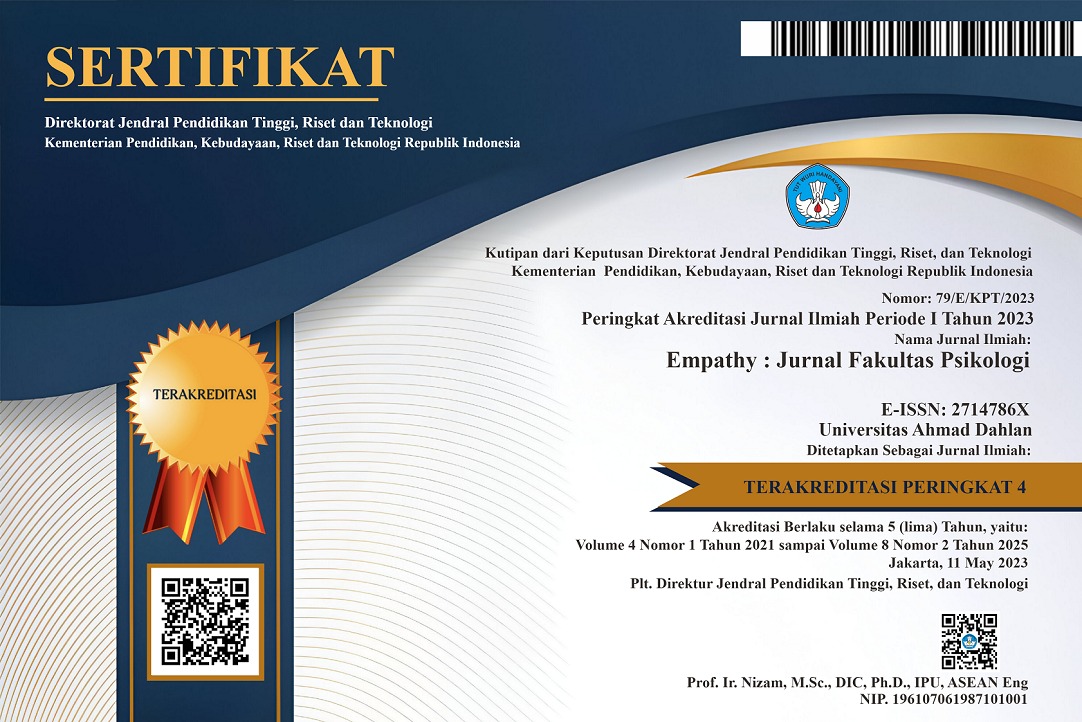Motivasi Berprestasi dan Prokrastinasi Akademik pada Peserta didik
DOI:
https://doi.org/10.12928/empathy.v5i2.23639Keywords:
academic procrastination, achievement motivationAbstract
Achievement Motivation and Academic Procrastination in Students
This study aims to examine the relationship between achievement motivation and academic procrastination in class XI students who study online at SMA Negeri X. This research uses a quantitative method. The sampling technique used was accidental sampling. The scale used is the achievement motivation scale and the academic procrastination scale. Analysis of research data using Pearson Product Moment correlation. The results of data analysis obtained a correlation of -0.826 (r=-0.826) with a significance level of p=0.000 (p<0.01). This shows that there is a very significant negative relationship between achievement motivation and academic procrastination. The effective contribution of the achievement motivation variable to academic procrastination is 68.3%. Based on the results above, it is concluded that there is a relationship between achievement motivation and academic procrastination in students. This means that the higher the achievement motivation, the lower the academic procrastination. Conversely, if the lower the achievement motivation, the higher the academic procrastination of students.References
Arikunto, S. (2006). Prosedur Penelitian, suatu Pendekatan Praktek. Jakarta: Rineka Cipta.
Azwar, S. (2017). Penyusunan Skala Psikologi, edisi II. Yogyakarta: Pustaka Pelajar.
Deliarnov (1996). Motivasi Untuk Meraih Sukses. Jakarta: Midas Suryo Grafindo.
Ferrari, J.R. (1991). Self-Handicapping by Procrastinator: Protecting Self Esteem, Social Esteem, or Both? Journal Research in Personality. Journal of research in personality, 25(3), 245-261. https://doi.org/10.1016/0092-6566(91)90018-L
Ferrari, J.R., Johnson, J.L., & McCown, W.G. (1995). Procrastination and Task Avoidance. (ebook) New York. Plenum Press.
Gage, N. L. & Berliner, D.C. (1992). Educational psychology (ed.5). Boston: Houghton Mifflin Company.
Hidayat, M.N. (1995). Perbedaan Motif Berprsetasi terhadap Lingkungan pada Program Pendidikan Kampung Improvement dan Pendidikan Kampung Nonimprovement. Skripsi (tidak diterbitkan). Yogyakarta: Fakultas Psikologi Universitas Gadjah Mada.
Knaus, W. (2002). The procrastination Workbook. New York: Harbinger Publications, Inc.
McClelland, D.C. (1985). Human Motivation. New York: Harvard University Press.
McClelland, D.C. (1987). Human Motivation. New York: Cambridge University Press.
Rumiani (2006). Prokrastinasi Akademik ditinjau dari Motivasi Berprestasi dan Stres Mahapeserta didik. Jurnal Psikologi Universitas Diponegoro. 3(2), 37-48. https://doi.org/10.14710/jpu.3.2.37%20-%2048
Sari, M., Rahmawati, S.W., & Lestari, M.A. (2017). Motivasi berprestasi dan prokrastinasi akademik. Jurnal Psiko Utama. Vol 5 No 2. https://doi.org/10.33366/ilg.v4i1.2443
Syaifulloh, Y., Susanti, S. & Mardi. (2021). Peran Kontrol diri dalam Motivasi Berprestasi dan Perfeksionisme terhadap Prokrastinasi Akademik Mahasiswa. Inteligensi: Jurnal Ilmu Pendidikan, 4(1), 27-36. https://jurnal.unitri.ac.id/index.php/inteligensi/article/view/2443
Santrock, J.W. 2003. Adolescence (Perkembangan Remaja) (ed 6). Jakarta: Erlangga.
Steel, P. (2007). The Nature of Procrastination: A Meta-Analytic and Theoritical Review of Quintessential Self-Regulatory Failure. Psychological Bulletin: The American Psychological Association, 133(1), 65-94. DOI:10.1037/0033-2909.133.1.65
Triyono & Khairi, A. M. (2018). Prokrastinasi Akademik Peserta didik SMA (Dampak Psikologis dan Solusi Pemecahannya dalam Perspektif Psikologi Pendidikan Islam). Al-Qalam Jurnal Kependidikan. 19(2), 57-74. https://ojs.unsiq.ac.id/index.php/al-qalam/article/view/517
Tice, D.M. & Baumeister, R.F. (1997). Longitudinal study of procrastination, performance, stress, and health: The cost and benefits of dawdling. Psychological Science, 8(6), 454-458. DOI: 10.7454/mssh.v17i1.1798
Ursia, N.R., Siaputra, I.B., & Sutanto, N. (2013). Prokrastinasi Akademik dan Self-Control pada Mahapeserta didik Skripsi Fakultas Psikologi Universitas Surabaya. Surabaya. Makara Seri Sosial Humaniora, 17(1), 1-18. DOI: 10.7454/mssh.v17i1.1798
Wiyono, A. (2018). Hubungan antara Kematangan Emosi dengan Prokrastinasi Akademik pada Mahapeserta didik Psikologi Angkatan 2017. Character: Jurnal Penelitian Psikologi, 5(2), 1-7. https://ejournal.unesa.ac.id/index.php/character/article/view/25326
Wolters, C. A. (2003). Understanding procrastination from a self-regulated learning perspective. Journal of Educational Psychology, 95(1), 179–187. https://doi.org/10.1037/0022-0663.95.1.179
Woolfolk, A.E.1995. Educational Psychology. 6th ed. Boston: Allyn and Bacon.
Zahra, Y. & Hernawati, N. (2015). Prokrastinasi Akademik Menghambat Peningkatan Prestasi Akademik Remaja di Wilayah Perdesaan. Jurnal Ilmu Keluarga dan Konsumen. 8(3), 163-172. https://doi.org/10.24156/jikk.2015.8.3.163
Downloads
Published
Issue
Section
License
Authors who publish with Empathy: Jurnal Fakultas Psikologi agree to the following terms:
- Authors retain copyright and grant the journal right of first publication with the work simultaneously licensed under a Creative Commons Attribution License (CC BY-SA 4.0) that allows others to share the work with an acknowledgment of the work's authorship and initial publication in this journal.
- Authors are able to enter into separate, additional contractual arrangements for the non-exclusive distribution of the journal's published version of the work (e.g., post it to an institutional repository or publish it in a book), with an acknowledgment of its initial publication in this journal.
- Authors are permitted and encouraged to post their work online (e.g., in institutional repositories or on their website) prior to and during the submission process, as it can lead to productive exchanges, as well as earlier and greater citation of published work.

This work is licensed under a Creative Commons Attribution-ShareAlike 4.0 International License.



